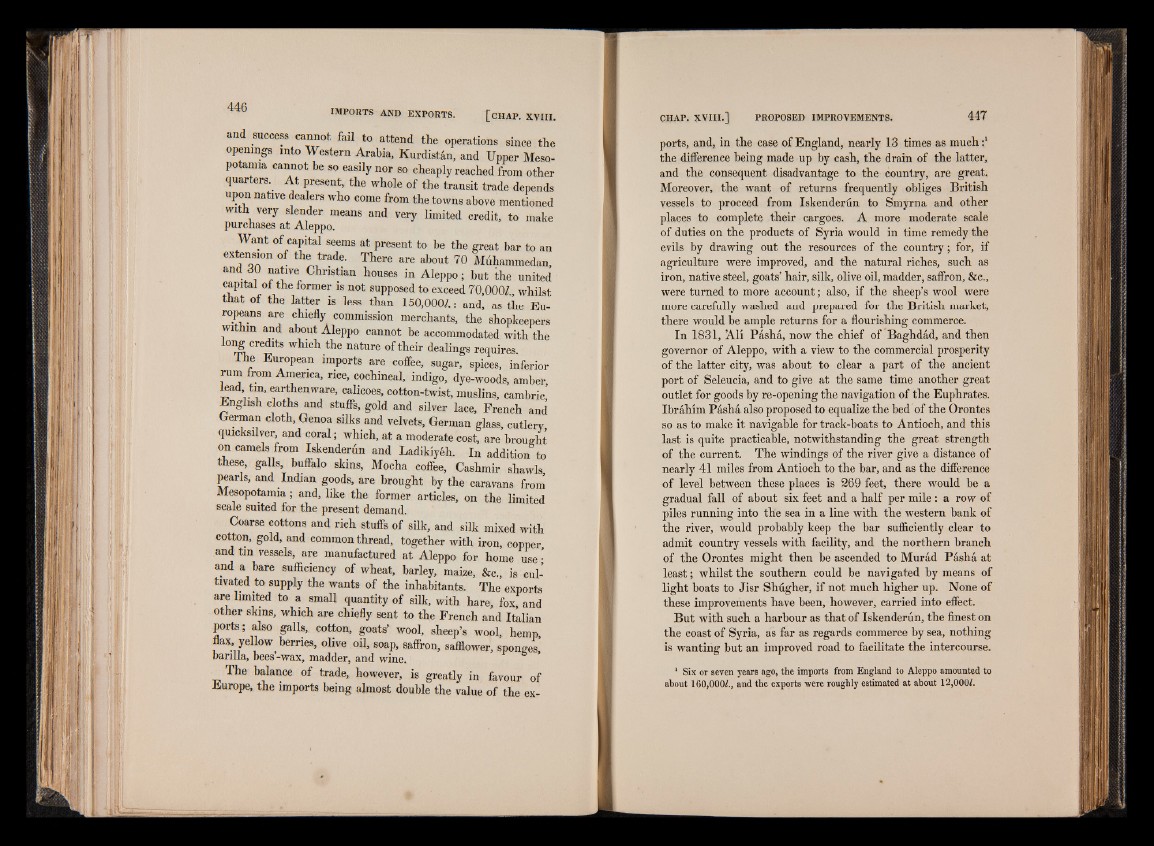
and success eannot fail to attend the operations since the
openings into Western Arabia, Kurdistan, and Upper Mesopotamia
cannot be so easily nor so cheaply reached from other
quarters. At present, the whole of the transit trade depends
upon native dealers who come from the towns above mentioned
wi very slender means and very limited credit, to make
purchases at Aleppo.
Want of capital seems at present to be the great bar to an
extension of the trade. There are about 70 Muhammedan,
and 30 native Christian houses in Aleppo; but the united
capital oi the former is not supposed to exceed 70,000/, whilst
that of the latter is less than 150,000/.: and, as the Europeans
are chiefly commission merchants, the shopkeepers
within and about Aleppo cannot be accommodated with the
long credits which the nature of their dealings requires.
The European imports are coffee, sugar, spices, inferior
rum from America, rice, cochineal, indigo, dye-woods, amber,
mad, tin, earthenware, calicoes, cotton-twist, muslins, cambric
English cloths and stuffs, gold and silver lace, French and
German cloth, Genoa silks and velvets, German glass, cutlery
quicksilver, and coral; which, at a moderate cost, are brought
on camels from Iskenderun and LadikiySh. In addition to
these, galls, buffalo skins, Mocha coffee, Cashmir shawls
pearls, and Indian goods, are brought by the caravans from
Mesopotamia; and, like the former articles, on the limited
scale suited for the present demand.
Coarse cottons and rich stuffs of silk, and silk mixed with
cotton, gold, and common thread, together with iron, copper
and tm vessels, are manufactured at Aleppo for home use •
and a bare sufficiency of wheat, barley, maize, &c., is cultivated
to supply the wants of the inhabitants. The* exports
are limited to a small quantity of silk, with hare, fox and
other skins, which are chiefly sent to the French and Italian
ports; also galls, cotton, goats’ wool, sheep’s wool, hemp
flax y e lW berries, olive oil, soap, saffron, safflower, sponges,’
barilla, bees-wax, madder, and wine.
The balance of trade, however, is greatly in favour of
Europe, the imports being almost double the value of the exports,
and, in the case of England, nearly 13 times as much :*
the difference being made up by cash, the drain of the latter,
and the consequent disadvantage to the country, are great.
Moreover, the want of returns frequently obliges British
vessels to proceed from Iskenderun to Smyrna and other
places to complete their cargoes, A more moderate scale
of duties on the products of Syria would in time remedy the
evils by drawing out the resources of the country; for, if
agriculture were improved, and the natural riches, such as
iron, native steel, goats’ hair, silk, olive oil, madder, saffron, &c.,
were turned to more account; also, if the sheep’s wool were
more carefully washed and prepared for the British market,
there would be ample returns for a flourishing commerce.
In 1831, Ali Pasha, now the chief of Baghdad, and then
governor of Aleppo, with a view to the commercial prosperity
of the latter city, was about to clear a part of the ancient
port of Seleucia, and to give at the same time another great
outlet for goods by re-opening the navigation of the Euphrates.
Ibrahim Pasha also proposed to equalize the bed of the Orontes
so as to make it navigable for track-boats to Antioch, and this
last is quite practicable, notwithstanding the great strength
of the current. The windings of the river give a distance of
nearly 41 miles from Antioch to the bar, and as the difference
of level between these places is 269 feet, there would be a
gradual fall of about six feet and a half per mile : a row of
piles running into the sea in a line with the western bank of
the river, would probably keep the bar sufficiently clear to
admit country vessels with facility, and the northern branch
of the Orontes might then be ascended to Murad Pasha at
least; whilst the southern could be navigated by means of
light boats to Jisr Shugher, if not much higher up. None of
these improvements have been, however, carried into effect.
But with such a harbour as that of Iskenderun, the finest on
the coast of Syria, as far as regards commerce by sea, nothing
is wanting but an improved road to facilitate the intercourse.
1 Six or seven years ago, the imports from England to Aleppo amounted to
about 160,0001., and the exports were roughly estimated at about 12,000/.